Jewish Folktales and Talmudic Stories (Page 2) |
If you wish to purchase any of these books, click on either the title or the book cover to be directed to Amazon.com. As a warning, I have put up pictures of the book covers to give you somewhat an idea of the style of each book (I know, I know. "Don't judge a book by its cover") so the pages may load slowly, depending on the speed of your internet connection.
If this page came up without frames, Click here to see the complete website
Other Pages of Interest:
Jewish Folktales and Talmudic Stories for Children
(Page 1)
(Page 2)
(Page 3)
(Page 4)
(Page 5)
(Page 6)
(Page 7)
Easy Reader and Picture Books:
Jewish Children's Books (General) |
Jewish Board Books |
Biblical Stories for Children |
Jewish Holiday Books |
Jewish Family Cookbooks |
Jewish Folktales and Talmudic Stories for Children
(Page 1)
(Page 2)
(Page 3)
(Page 4)
(Page 5)
(Page 6)
(Page 7)
|
Jewish Life Books (Mitzvot, Keeping Kosher, etc.) |
Jewish Life Cycle Books |
Family Haggadahs |
Children's Prayerbooks |
Introductory Hebrew Books |
Jewish History and Historical Fiction Picture Books |
Israel Books
Middle School and YA Books:
Bar Mitzvah Books |
Jewish Fiction |
Historical Fiction |
Torah Study |
Prayer and Jewish Life Books |
Jewish Holidays |
Jewish Biographies |
Jewish History Books |
Holocaust Books for Teens |
Israel Books
Jewish Books for Children |
Bar Mitzvah Books |
Jewish Parenting Books |
Jewish Music for Children |
Jewish Videos |
Jewish Toys and Gifts |
Jewish Gift Baskets and Gourmet Food |
Jewish Jewelry |
Amazon.com Coupons, Promotions, and Sales

Miriam's Tambourine:
Jewish Folktales from around the World
By Howard Schwartz
Drawing upon their rich religious and cultural heritage--a heritage that
stretches back to Biblical times and passes through many varied epochs and
environments--Jewish sages, artists, writers, and storytellers have
continually created imaginative and evocative formulations of Jewish
philosophy, literature, art, law, liturgy, ritual, and especially new
forms of folklore.
Miriam's Tambourine presents fifty classic Jewish folktales that
come from virtually every corner of the globe and every historical period.
Readers of all ages will delight in the Jewish versions of the Snow White,
Rapunsel, and Sinbad stories, which in some cases were the original sources
of these popular folktales. Howard Schwartz has also selected and retold
those tales which have retained their uniquely Jewish character and have
become part of the heritage of the Jewish people, including the Golem, the
tales of Rabbi Nachman of Bratzlav and of the Ba'al Shem Tov, tales of
Elijah the Prophet, Miriam and her mystical well, Rabbi Adam, and even of
the Sambotyon, the legendary river that raged six days of the week and
rested on the Sabbath.
Recast in a form accessible to readers both young and old, yet true to
their provenances, these tales continue to enthrall and capture the
imagination as they illustrate the power of man to overcome evil; the
longing of the Jewish people to return to their homeland; and the universal
prayer for a world at peace. Providing careful annotation of sources and a
brilliant analysis of meanings and symbolisms, Miriam's Tambourine represents
a landmark in Jewish folk literature and in American-Jewish culture.
Description from Publisher
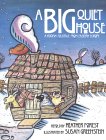
A Big Quiet House:
A Yiddish Folktale from Eastern Europe
By Heather Forest
"Feathers were flying, the children were crying, the wife was
sighing, and the man couldn't sleep." In a rhythmic storytelling
voice, Forest gives us a wonderful version of the old Yiddish
folktale It Could Always Be Worse. Greenstein's bold,
colorful pictures with thick black lines are great for group
sharing; they capture the broad farce and the droll characters
of the shtetl setting. A man can't sleep in his small crowded
house, so he gets up in the middle of the night and asks the
wisewoman of the village for help. She suggests he bring a
chicken into the house, and then a cow, a horse, a goat, and
a sheep. Of course, the nonsense advice creates more and more
chaos, and the pictures show the animals filling the space,
singing and snorting and noisily pecking. Then the wisewoman
tells him to put the animals back in the barn, and suddenly
his house is big and quiet. An endnote discusses sources and
message, but children will love the nonsense.
Description from Booklist
A man finds his house to be way too small: he hears his wife snoring and his children giggling all the time. He goes to an old woman in the village for help. She instructs him to move various animals from the barn to the house. The more animals that are moved into the house, the more hilarious the chaos that ensues. Finally, the wise old woman instructs him to move all the animals back into the barn. Suddenly, the house that used to be too small and too loud is now big and quiet. Forest retells the Yiddish folktale "It Could Always Be Worse" with lyrical rhymes and enough repetition to make it a perfect selection for reading aloud. Greenstein's bright illustration will easily engage any child. A perfect selection for storytime.
Lori's Description
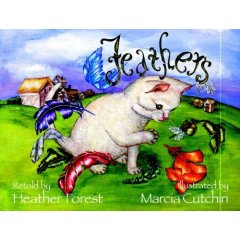
Feathers
By Heather Forest
Words, like feathers fly
in the wind, in the wind.
Careless words, tossed about,
cannot again be swallowed up.
Rumors and gossip can be permanent and damaging. The victim's reputation is harmed, and the trust in the community erodes. In this traditional folktale from Eastern Europe, a gossip is brought before a wise rabbi, who must concoct a suitable lesson. His clever solution demonstrates vividly the consequence and permanence of words spoken in haste. It is easy to spread gossip, but impossible to take it back. Heather Forest's rhythmic retelling reflects the pathos of the story and the wisdom of the rabbi. Marcia Cutchin's bright watercolor palette captures the activity of a traditional Jewish shtetl, where one person's business is everyone's business.
Description from Publisher
In this sweet retelling of a Yiddish folktale, a woman learns how gossip cannot be easily remedied. The woman tells rumors about others but feels that she can just take back her words and all will be forgiven. The Rabbi tells her to cut open a pillow and allow the feathers to fly through the air. Once they have flown away, she was told to bring back each feather. As hard as she tried, she could not complete his task because they had scattered throughout the land. Marcia Cutchin's bright watercolor illustrations will easily capture the attention of young children. Heather Forest's narrative with short, simple sentences makes this an ideal choice for reading aloud to toddler and preschoolers.
Lori's Description
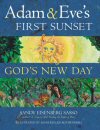
Adam & Eve's First Sunset: God's New Day
By Sandy Eisenberg Sasso
What will Adam and Eve do when the sun begins to set for the first time? Is it their fault? Does it mean that God is angry? Award-winning author Sandy Eisenberg Sasso has created another profound story—a beautiful recasting of the biblical tale of Adam and Eve in the Garden—for today’s children, their parents, and their teachers. This is the story of Adam and Eve’s first test of trust and faith and how they learned to find hope and light—even in the dark.
Description from Publisher
Children view the world in simple terms. The ongoing war in Iraq, the recent remembrances of the September 11 attacks, child abductions -- each of these can cause kids to think that everything they hold dear could come to an end. Adam & Eve's First Sunset: God's New Day, by award-winning children's author and spiritual development expert Sandy Eisenberg Sasso, with full color acrylic paintings by Joani Keller Rothenberg, helps parents ease children's fears with a practical story based on teh familiar, ancient myth.
A lesson in hope and faith - and learning that there are some things in life behond our control - Adam & Eve's First Sunset: God's New Day is for every child who has worried about what comes next. After spending their first day in the Garden of Eden, safe and unshadowed by worry, doubt, or fear, Adam and Eve realize that the sun is slipping away. They yell at the sun, then each other, and worry that God has abandoned them. Before falling asleep, they pray, "God, Creator of the Great Light, make morning again." When morning does come, Adam and Eve realize that they have not been forsaken and that night is just another of God's creations. They then live their lives blessing both the day and the night.
Description from Publisher
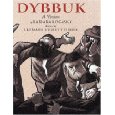
Dybbuk: A Version
By Barbara Rogasky
This retelling of an early-20th-century play based on a Jewish legend is uneasily balanced between an evocation of European shtetl life and a ghost story. Leah and Konin were promised to one another by their fathers even before they were born. However, when Leah is old enough to be married, Sender, her father, wants her betrothed to a rich man. Konin, now a poor orphaned scholar, meets Leah and they fall instantly, irrevocably in love. Thwarted by Sender's greed, the young man studies the Kabbalah, searching for a way to obtain the necessary wealth. When he fails, he dies and comes back as a dybbuk–an unhappy spirit that possesses Leah's body and speaks through her lips. Though an exorcism is performed, she chooses to rejoin Konin and dies before she can marry the man her father has selected. Stories of the supernatural have undeniable appeal, but this one, with its archaic setting and strongly religious connections, seems too specialized for most collections. Rogasky's writing, which is full of inverted phrases (e.g., Pious and sincere they were or Old it is, centuries old), is distancing--even though she addresses readers directly at times (Forgive me, Dear Reader. I cannot explain the meaning of all that happened….). Fisher's dramatic black, white, and brown-toned illustrations add to the hard-edged, unyielding nature of the tragic tale.
Description from School Library Journal
A Jewish legend about a girl's possession by a dybbuk, or restless spirit, is strikingly retold in a picture book that fits as smoothly into collections of children's Judaica as it does in sections of scary Halloween stories. Rogasky chooses to tell her version in a narrative longer than a traditional picture book, but she doesn't expend words idly; her storytelling is rich and powerful, as adept in conveying a sense of Hasidic culture as it is in narrating moments of sheer terror. These are terrifying indeed: Rogasky's dybbuk is a poor, orphan boy who dies when his destined fiancee is promised to another, and returns as a ghost to be united with his true love. Extending the horror are starkly composed, monumental oils in inky blacks and moonlit grays by venerable illustrator Fisher. Particularly noteworthy is Rogasky's distinct treatment of various voices, ranging from the narrator's intimate tone to the villagers' gossipy banter to the ghost's creepy pronouncements. With some artful adaptation, this will work well for readers' theater or storytelling performances.
Description from Booklist
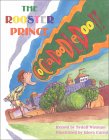
The Rooster Prince
By Sydell Waxman
Based on a parable told by the great Jewish sage, Rabbi
Nachman of Bratslav, this story tells of Avron, a poor
village boy in 18th-century Russia, who is taken by the
Tsar's messenger to the palace and instructed to cure
the prince of acting like a rooster. When Avron notices
that the prince/rooster is aping his own actions, the
peasant boy quickly realizes how to coax him into behaving
like a prince again.
Description from School Library Journal

God Said Amen
By Sandy Eisenberg Sasso
In this warm and inspiring tale, two rulers, the Prince of the
Midnight Kingdom and the Princess of the Desert Kingdom, each
have a big problem.
The Midnight Kingdom is overflowing with water, but in desperate
need of oil to light its lamps. The Desert Kingdom is blessed
with oil, but in dire need of water to grow its gardens. Each
faces disaster. After all, the Prince cannot be princely without
his royal pajamas, and he can’t find them in the dark; the
Princess cannot be princess-ly without her royal tea, and she
can’t make tea without water!
The royal rulers each ask God for help, but they prove too
stubborn and full of pride to ask each other. It takes a
minstrel, a pair of opinionated royal riding-birds and their
young keepers, and a simple act of kindness for the kingdoms
to learn that they need only reach out to each other to find
God’s answers to their prayers.
Description from Publisher
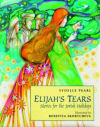
Elijah's Tears: Stories for the Jewish Holidays
By Sydelle Pearl
In a lively, storytelling style, Elijah's Tears offers a dramatic human context to the many Jewish holidays that are celebrated throughout the year. Five stories illuminate the many faces and mysteries of Elijah, the Jewish prophet who is known for appearing in disguise and testing the character of those in need. In "Leaves," a destitute elderly couple is heartbroken when they must sell their sacred Shabbat candlesticks for food. That evening when the husband and wife encounter an even poorer Jewish man wearing torn, shabby clothes, they offer to mend his garments. They even keep him warm in their bed while they sew (since the man owns no other clothes). Of course the mysterious man turns out to be Elijah, and he rewards the couple as he walks away by turning his footprints into leaves of gold. The ethereal figures and Jewish symbols in Rossitza Skortcheva Penney's black-and-white illustrations seem to float upon the pages, bringing even more celestial imagery and magic to the elusive Elijah. Children love folktales that allow good deeds to be rewarded, especially when the rewards come from unexpected characters.
Description from Amazon.com
This breakthrough children's book by Sydelle Pearl will quickly find itself a place among Jewish holiday traditions. In five original tales, each relating to an important Jewish holiday, Elijah aids those who are in need while challenging those who have lost their faith. The young prophet finds himself summoned by God to wander the earth for a three month period in order to observe the Jewish people's handling of the Torah. Read along in 'Leaves', as he rewards a poor family that has sold their most prized possession for food; in 'The Tallis', witness the poignant circumstances concerning an old, dishevelled man and a young boy who writes a prayer on his behalf. Each tale, accompanied by rich illustrations, provides young readers with a beautifully crafted introduction to Elijah, God's great messenger for the Jewish people.
Description from Publisher
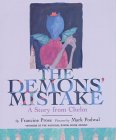
The Demons' Mistake:
A Story from Chelm
By Francine Prose
For all those in today's workaday world who wonder just who to curse
when their computers go haywire, the milk turns sour, and the traffic
lights get fouled up, the answer is plain. The demons! These
mischievous imps like nothing better than to spoil people's fun, and
will go to great lengths to do so. Take the demons of Chelm, Poland,
for example. Bored with messing up the foolish villagers' hair and
making livestock fly, the demons decide to take their mischief on
the road--to an amazing-sounding place called New York. There, they've
heard, the streets are paved with gold, the buildings are made of
silver, and there are parties every day--a perfect opportunity for
havoc wreaking. So the small-town demons sneak into a crate en route
to America. A series of mishaps keeps them stranded in a warehouse
near the shipyards for fifty years. When they are finally freed they
find themselves in a stranger world than they ever imagined. It's
going to be a challenge to find ways to torment this all-new variety
of humans who bustle around in cars, speak on cell phones, and watch
TV--but they'll manage.
The mischievous demons of Chelm, the legendary town in Poland where only fools live, wreak havoc on a daily basis. They make the milk go sour, herd livestock into the sky, and rip people's clothing and tangle their hair. Then they hear about an irresistible new place called New York City. A city jammed with unsuspecting people, motor cars, and tall, shiny buildings--a mayhem loving demon's dream! When they get there, though, the big city is more than a match for the small-town demons of Chelm. . .
Description from Publisher
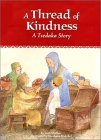
A Thread of Kindness :
A Tzedakah Story
By Leah Shollar
Avraham, a poor farmer from Constantinople, worries that his wife and sons do not have enough money for food and clothing. One day, while toiling in his fields, he meets an old man who offers him six years of wealth, to be dispersed immediately or at the end of his life. Avraham requests the money right away, and that very day his sons uncover a large chest of gold. His wife, Esther, considers the money a "thread of kindness" and convinces her husband to use their wealth to help others. In the end, the old man allows the family to keep the money because their acts of kindness and generosity helped so many. Shollar has adapted this tale from the Midrash, a collection of early Jewish commentaries offering interpretations of Biblical text. The story is simply told, although the liberal use of Hebrew terms (Hashem for God; abba and imma for father and mother) will make the glossary, which precedes the story, a necessity for some readers. Mekibel's soft, watercolor illustrations exude an Old World feel suited to the setting and tone of the text. A story that's heavy on message without ever becoming preachy, the book will be a welcome addition to religion collections.
Description from Booklist
A nice retelling of a familiar tale of kindness and community. Shollar bases her picture book on a Midrash from the Yalkut Shimoni. Avraham and Esther are poor but pious, struggling to put food on the table for their young sons. When a mysterious old man gives Avraham a choice between the blessing of six years of wealth now, or six years of wealth in old age, the man takes the question to his wife. Esther, as wise as her namesake, chooses to take the wealth immediately, and begins a thread of kindness and charity, which reaches throughout their community. They buy shoes for a barefoot child, purchase a chuppah for a bride's wedding day, and give money to help a mother afford her son's bar mitzvah. At the end of the six years, the old man returns to reclaim the treasure, but of course the riches remain with Avraham's family, and "the thread of kindness stretches on to this very day." Mekibel's watercolors lend a dreamy cast to the illustrations, as if they are memories of long ago. A solid addition to Jewish folklore collections
Description from School Library Journal
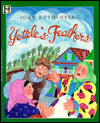
Yettele's Feathers
By Joan Rothenberg
Yettele Babbelonski loves to gossip. With a perfect view of the
town and nothing to do all day, how can she help herself? When
the neighbors complain about her tall tales, she shrugs them
off. After all, she says, her stories are only words, and words
are no more hurtful than feathers.
It takes a wise rabbi with a clever ruse to change her mind. At
the rabbi's request, Yettele cuts open a pillow and carries it
across town. When the wind blows the feathers away, she discovers
how hard it is to gather them back and repair the damage.
Rothenberg's moral tale has a warm, comic quality. The gouache
illustrations feature candylike tones of green, purple, and blue.
Characters are drawn with broad, humorous strokes, and the town
is a happy jumble of people, buildings, trees, and sky. The book
comes to a fitting close as Yettele finds new pleasures in
telling stories about her own life to the town children.
Description from Booklist, May 1, 1995
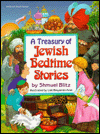
A Treasury of Jewish Bedtime Stories
By Shmuel Blitz
These twenty-one stories cover the gamut from gentle humor to
profound faith to warm kindness. The heroes range from kings
and sages to wise travelers and fantasizing laborers. This is one
of those rare books that youngsters will curl up with again and again.
Description from Publisher
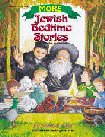
More Jewish Bedtime Stories: Tales of Rabbis and Leaders
By Shmuel Blitz
Mommy, more stories -- please!” Many a mother (and father) has heard this plea from children who have listened to A Treasury of Jewish Bedtime Stories over and over again. There is no shortage of storytellers, but few have mastered the craft as well as Shmuel Blitz and his great illustrator Liat Binyamini Ariel. So when their bestselling Treasury evoked calls for more, they went back to their writing table and easel -- and this new book is the happy result.
This book is filled with stories of great Jews, in their youth and maturity; charming, inspiring, enjoyable stories; stories that are models of behavior; stories that show precocity; stories that show compassion; and stories that give parents springboards for loving messages about present behavior and future goals.
Your children will want to hear these stories and enjoy the illustrations over and over again. And they’ll be able to, because the book has a sturdy, child-resistant binding.
When your little ones clutch this book as they fall asleep, they’ll have the stuff of good dreams in their precious minds.
Description from Publisher
This new volume of bedtime stories concentrates on stories of great geonim and tzaddikim. Your children will love to hear about the best night the Steipler ever had, the Sanzer Rav's missing gold cup, and Rabbi Akiva Eiger's empty coach. Sound fascinating? They are. And so are all the other stories in this wonderful childrens book. Illustrated by Liat Benyamini Ariel.
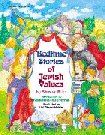
Bedtime Stories of Jewish Values
By Shmuel Blitz
Honesty, loyalty, piety, generosity, faith -- there is a long list of virtues that parents and teachers long to inculcate in their children. Textbooks cannot do it. Preaching often fails. Example is hard to find.
Stories are often the best tool. What can be more enjoyable than a good story, and what can be more effective than such a story with a moral subtly woven within it?
Such are the stories in this new offering from the pen of Shmuel Blitz, illustrated by the brush of Liat Binyamini Ariel, whose collaboration began with the best-selling Treasury of Jewish Bedtime Stories.
In this new, beautifully illustrated collection, Blitz tells many stories with a message. Some are familiar. Some are original. All are adapted for a child’s interest.
The reader may note that many of the stories originate in Talmudic and Midrashic literature. Others are familiar from generations ago. Here they are crafted to grab a child’s wide-eyed attention and keep him or her asking to hear them and feast on their illustrations again and again. The sturdy, child-resistant binding guarantees many days and nights of enjoyable, beneficial use.
Put this book with your child’s favorites, and watch the virtues flow.
Descripiton from Publisher

Ten Classic Jewish Children's Stories
By Peninnah Schram
These classic tales of Miriam, Aaron, Abraham and others,
reveal the traits that made them heroes of the Jewish people and the world .
Description from Publisher
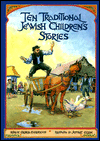
Ten Traditional Jewish Children's Stories
By Gloria Goldreich
Goldreich has created a wonderful bedtime book. The pictures are magnificent,
showing all the joys of life in the Shtetl, while not totally glossing over the fact
that shtetl life was often difficult, dirty, and poor. The story "Don't Make Me
Do What My Father Did" is laugh-aloud funny-what could his father have
done when no one would give him food? And "Half Price to Letchev" teaches
us that a bargain is often worth even less than what you paid for it. The pictures
are fabulous. A garden is so real that the vegetables and flowers just beg to be
picked.
Description from Children's Literature

Ten Best Jewish Children's Stories
By Chana Sperber and Rabbi Daniel Sperber
A collection of traditional stories, with thought-provoking questions after each
one. Selections include the familiar "How Could It Be Worse?," "For the Love
of Two Brothers," "Nicanor's Golden Doors," and "Yosef's Love for the Sabbath."
Less familiar are "God's Hidden Ways" (sometimes misfortune saves one from a
tragedy), "More Valuable Than Gold" (the value of honoring one's father),
"The Scorpion and the Wedding" (an act of kindness and charity saves a sage's
bride from being bitten by a sorcerer's scorpion), and "The Shadow on the
House of Study" (it is permissible to do ordinarily forbidden activities on the
Sabbath to save a life). There is one treasure here-"The Chickens That Turned
into Goats." Never mind what it teaches-it is perfect on its own. The stories are
simply told and stripped to their oral-storytelling essentials. The artist draws
great goats and wonderfully expressive human faces and hands in a dramatic,
naturalistic style.
Description from School Library Journal
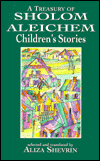
A Treasury of Sholom Aleichem Children's Stories
A rich collection of 25 stories written for and about children by the most beloved
Yiddish writer, these tales describe life for children in the impoverished yet lively
shtetls of Eastern Europe. Readers will see their lives through holiday observances,
family ties, schoolmates, flights of fancy, and the daily struggles and joys of childhood.
Description from Publisher

Perfect Porridge
By Rochel Sandman
Zayde Mendel wants to do his share of kindness and cook porridge for
hungry people during the War. The problem is, as Bubbe Hinda points
out, he's never cooked anything in his life! But Zayde keeps asking,
"How hard could it be?" In this tale, based on true events, Bubbe
Hinda is kind to the sick, Zayde Mendel is kind to the hungry,
and both of them are kind to each other.
Description from Publisher
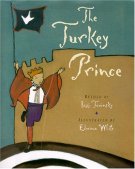
The Turkey Prince
By Izzi Tooinsky
Based on a heart-stirring Hasidic tale, The Turkey Prince tells the story of a young prince who believes he is a turkey.
One evening at a royal banquet, the flustered young prince is pushed forward to make a speech, but the pressure of it turns him into a turkey. People from miles around are called in to help . . . but nothing works until one day a mysterious healer comes to the palace. Stunning and unique illustrations capture the spirit of this unusual story, making The Turkey Prince a precious gift to anyone who has ever felt like a turkey inside.
Description from Publisher

Classic Jewish Tales
By David Sokoloff
This is a delightful introduction to the remarkable range of stories which have enriched Jewish life throughout the generations.
This collection of tales, retold for little listeners, explains how:
- A man tries to win a bet by angering a famous Rabbi.
- A wedding is so joyful that even some angels join in the fun!
- The true meaning of charity is surprisingly found in the middle of a freezing winter night.
- To help his son learn the value of money, a father actually throws a hundred dollars into the river!
Adapted from Jewish Folklore, The Talmud, and Hasidic Tradition and illustrated with dozens of charming drawings, Classic Jewish Tales welcomes kids to the world of Jewish literature.
Description from Publisher
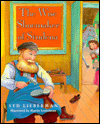
The Wise Shoemaker of Studena
By Syd Lieberman
Renowned storyteller Lieberman spins an uproarious yet meaningful tale
in his first picture book. Although Yossi is a fine shoemaker, people
also come to his shop in a tiny Hungarian village seeking his sage advice.
So respected is Yossi's wisdom that Samuel, a wealthy merchant, invites
the humble shoemaker to his daughter's wedding. But when Yossi arrives
at the wedding in his worn and accidentally soiled clothes, Samuel
mistakes him for a beggar and rudely shows him out. However, with
the assistance of another wealthy man, Yossi returns to the wedding
dressed in the very finest. This time Samuel welcomes Yossi but
becomes horrified by the shoemaker's behavior: he smears sauerkraut
on his sleeve and smashes apple strudel against his silk shirt,
outrageous actions intended to teach Samuel a much-needed lesson
about judging people by their appearance. Lemelman's luminously
colored art has a TV-animation slickness that will appeal to children.
A hilarious, well-told tale for reading aloud or sharing one-on-one.
from Booklist
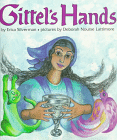
Gittel's Hands
By Erica Silverman
Gittel's adoring father brags relentlessly about her many talents
and even offers her services as a seamstress and a cook to
pay off his debt to Reb Raya. But Reb Raya provides neither
a needle for sewing nor wood for the stove. Given one last
chance to help her father, Gittel is locked in Reb Raya's cellar
and instructed to fashion a ceremonial goblet from a single
silver coin. Helpless and alone, she sees a shivering beggar
outside the window and offers him her shawl. Suddenly, the
beggar appears in the cellar and, with tools, flame, and bars
of silver, teaches Gittel to make beautiful plates, candlesticks,
and the required Elijah's cup. Of course, the benevolent
beggar is the prophet Elijah himself. Gittel goes free, her
father's debt is paid, and the greedy merchant gets his due
in a satisfying conclusion. Luminous and sometimes unusual
colors--a purple dove, a green cat--and a topsy-turvy,
collagelike interplay of textures and geometric shapes create
the effect of a Chagall stained-glass window, ensuring that
there is much to occupy the eyes as well as the hearts of
story lovers.
from Booklist
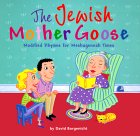
The Jewish Mother Goose :
Modified Rhymes for Meshugennah Times
By David Borgenicht
Mother Goose a Jewish Mother? Little Bo Peep would plotz! Welcome to
the world of The Jewish Mother Goose, a collection of more than fifty classic
nursery rhymes rewritten to poke fun and to celebrate the long tradition of Jewish
literary humor. The perfect gift for Rosh Hashanah, Hanukkah, bar and bat mitzvahs,
Tu B'Shvat, Purim, birthdays, or any time you feel like saying Mazel Tov!
Description from Publisher

A Coat for the Moon and Other Jewish Tales
By Howard Schwartz and Barbara Rush
Over the centuries Jews have moved from country to country, bringing
their most precious belongings-their stories-with them around the
world. What better way to make children feel at home, after all, than
by telling a story?
In this new collection, which brings together fifteen classic
Jewish folk tales, the authors share some of the richest stories of
Jewish tradition from countries the world over, including France,
Turkey, Israel, Yemen, Egypt, and Iraq, thus opening up new worlds
for young readers. Each tale, magnificently illustrated with a
pen-and-ink drawing, reveals a specific Jewish value handed down
from one generation to the next.
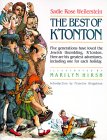
The Best of K'tonton
By Sadie Rose Weilerstein
Sixteen stories, one for each holiday. The "Jewish Tom Thumb"
takes a ride on a chopping knife, spins on a run-away Hanukkah top,
travels to Israel, and to his magic island.
Page 1 |
Page 2 |
Page 3 |
Page 4 |
Page 5 |
Page 6 |
Page 7
Still can't find what you're looking for? Search Amazon.com's database directly.
©1999-2009
(NOTE: The following links have NOT been placed on the site by the website owners. We have no control over which ads are selected and are not responsible for their religious content.)
If this page came up without frames, Click here to see the complete website
Other Pages of Interest:
Jewish Folktales and Talmudic Stories for Children
(Page 1)
(Page 2)
(Page 3)
(Page 4)
(Page 5)
(Page 6)
(Page 7)
Easy Reader and Picture Books:
Jewish Children's Books (General) |
Jewish Board Books |
Biblical Stories for Children |
Jewish Holiday Books |
Jewish Family Cookbooks |
Jewish Folktales and Talmudic Stories for Children
(Page 1)
(Page 2)
(Page 3)
(Page 4)
(Page 5)
(Page 6)
(Page 7)
|
Jewish Life Books (Mitzvot, Keeping Kosher, etc.) |
Jewish Life Cycle Books |
Family Haggadahs |
Children's Prayerbooks |
Introductory Hebrew Books |
Jewish History and Historical Fiction Picture Books |
Israel Books
Middle School and YA Books:
Bar Mitzvah Books |
Jewish Fiction |
Historical Fiction |
Torah Study |
Prayer and Jewish Life Books |
Jewish Holidays |
Jewish Biographies |
Jewish History Books |
Holocaust Books for Teens |
Israel Books
Jewish Books for Children |
Bar Mitzvah Books |
Jewish Parenting Books |
Jewish Music for Children |
Jewish Videos |
Jewish Toys and Gifts |
Jewish Gift Baskets and Gourmet Food |
Jewish Jewelry |
Amazon.com Coupons, Promotions, and Sales
Other Pages of Interest:
Jewish Folktales and Talmudic Stories for Children
(Page 1)
(Page 2)
(Page 3)
(Page 4)
(Page 5)
(Page 6)
(Page 7)
Easy Reader and Picture Books:
Jewish Children's Books (General) |
Jewish Board Books |
Biblical Stories for Children |
Jewish Holiday Books |
Jewish Family Cookbooks |
Jewish Folktales and Talmudic Stories for Children
(Page 1)
(Page 2)
(Page 3)
(Page 4)
(Page 5)
(Page 6)
(Page 7)
|
Jewish Life Books (Mitzvot, Keeping Kosher, etc.) |
Jewish Life Cycle Books |
Family Haggadahs |
Children's Prayerbooks |
Introductory Hebrew Books |
Jewish History and Historical Fiction Picture Books |
Israel Books
Middle School and YA Books:
Bar Mitzvah Books |
Jewish Fiction |
Historical Fiction |
Torah Study |
Prayer and Jewish Life Books |
Jewish Holidays |
Jewish Biographies |
Jewish History Books |
Holocaust Books for Teens |
Israel Books
Jewish Books for Children |
Bar Mitzvah Books |
Jewish Parenting Books |
Jewish Music for Children |
Jewish Videos |
Jewish Toys and Gifts |
Jewish Gift Baskets and Gourmet Food |
Jewish Jewelry |
Amazon.com Coupons, Promotions, and Sales
Easy Reader and Picture Books:
Jewish Children's Books (General) | Jewish Board Books | Biblical Stories for Children | Jewish Holiday Books | Jewish Family Cookbooks | Jewish Folktales and Talmudic Stories for Children (Page 1) (Page 2) (Page 3) (Page 4) (Page 5) (Page 6) (Page 7) | Jewish Life Books (Mitzvot, Keeping Kosher, etc.) | Jewish Life Cycle Books | Family Haggadahs | Children's Prayerbooks | Introductory Hebrew Books | Jewish History and Historical Fiction Picture Books | Israel Books
Middle School and YA Books:
Bar Mitzvah Books | Jewish Fiction | Historical Fiction | Torah Study | Prayer and Jewish Life Books | Jewish Holidays | Jewish Biographies | Jewish History Books | Holocaust Books for Teens | Israel Books
Jewish Books for Children | Bar Mitzvah Books | Jewish Parenting Books | Jewish Music for Children | Jewish Videos | Jewish Toys and Gifts | Jewish Gift Baskets and Gourmet Food | Jewish Jewelry | Amazon.com Coupons, Promotions, and Sales
 Miriam's Tambourine: Jewish Folktales from around the World By Howard Schwartz |
Drawing upon their rich religious and cultural heritage--a heritage that
stretches back to Biblical times and passes through many varied epochs and
environments--Jewish sages, artists, writers, and storytellers have
continually created imaginative and evocative formulations of Jewish
philosophy, literature, art, law, liturgy, ritual, and especially new
forms of folklore.
Miriam's Tambourine presents fifty classic Jewish folktales that come from virtually every corner of the globe and every historical period. Readers of all ages will delight in the Jewish versions of the Snow White, Rapunsel, and Sinbad stories, which in some cases were the original sources of these popular folktales. Howard Schwartz has also selected and retold those tales which have retained their uniquely Jewish character and have become part of the heritage of the Jewish people, including the Golem, the tales of Rabbi Nachman of Bratzlav and of the Ba'al Shem Tov, tales of Elijah the Prophet, Miriam and her mystical well, Rabbi Adam, and even of the Sambotyon, the legendary river that raged six days of the week and rested on the Sabbath. Recast in a form accessible to readers both young and old, yet true to their provenances, these tales continue to enthrall and capture the imagination as they illustrate the power of man to overcome evil; the longing of the Jewish people to return to their homeland; and the universal prayer for a world at peace. Providing careful annotation of sources and a brilliant analysis of meanings and symbolisms, Miriam's Tambourine represents a landmark in Jewish folk literature and in American-Jewish culture. |
 A Big Quiet House: A Yiddish Folktale from Eastern Europe By Heather Forest |
"Feathers were flying, the children were crying, the wife was
sighing, and the man couldn't sleep." In a rhythmic storytelling
voice, Forest gives us a wonderful version of the old Yiddish
folktale It Could Always Be Worse. Greenstein's bold,
colorful pictures with thick black lines are great for group
sharing; they capture the broad farce and the droll characters
of the shtetl setting. A man can't sleep in his small crowded
house, so he gets up in the middle of the night and asks the
wisewoman of the village for help. She suggests he bring a
chicken into the house, and then a cow, a horse, a goat, and
a sheep. Of course, the nonsense advice creates more and more
chaos, and the pictures show the animals filling the space,
singing and snorting and noisily pecking. Then the wisewoman
tells him to put the animals back in the barn, and suddenly
his house is big and quiet. An endnote discusses sources and
message, but children will love the nonsense.
A man finds his house to be way too small: he hears his wife snoring and his children giggling all the time. He goes to an old woman in the village for help. She instructs him to move various animals from the barn to the house. The more animals that are moved into the house, the more hilarious the chaos that ensues. Finally, the wise old woman instructs him to move all the animals back into the barn. Suddenly, the house that used to be too small and too loud is now big and quiet. Forest retells the Yiddish folktale "It Could Always Be Worse" with lyrical rhymes and enough repetition to make it a perfect selection for reading aloud. Greenstein's bright illustration will easily engage any child. A perfect selection for storytime. |
 Feathers By Heather Forest |
Words, like feathers fly
in the wind, in the wind. Careless words, tossed about, cannot again be swallowed up. Rumors and gossip can be permanent and damaging. The victim's reputation is harmed, and the trust in the community erodes. In this traditional folktale from Eastern Europe, a gossip is brought before a wise rabbi, who must concoct a suitable lesson. His clever solution demonstrates vividly the consequence and permanence of words spoken in haste. It is easy to spread gossip, but impossible to take it back. Heather Forest's rhythmic retelling reflects the pathos of the story and the wisdom of the rabbi. Marcia Cutchin's bright watercolor palette captures the activity of a traditional Jewish shtetl, where one person's business is everyone's business. In this sweet retelling of a Yiddish folktale, a woman learns how gossip cannot be easily remedied. The woman tells rumors about others but feels that she can just take back her words and all will be forgiven. The Rabbi tells her to cut open a pillow and allow the feathers to fly through the air. Once they have flown away, she was told to bring back each feather. As hard as she tried, she could not complete his task because they had scattered throughout the land. Marcia Cutchin's bright watercolor illustrations will easily capture the attention of young children. Heather Forest's narrative with short, simple sentences makes this an ideal choice for reading aloud to toddler and preschoolers. |
 Adam & Eve's First Sunset: God's New Day By Sandy Eisenberg Sasso |
What will Adam and Eve do when the sun begins to set for the first time? Is it their fault? Does it mean that God is angry? Award-winning author Sandy Eisenberg Sasso has created another profound story—a beautiful recasting of the biblical tale of Adam and Eve in the Garden—for today’s children, their parents, and their teachers. This is the story of Adam and Eve’s first test of trust and faith and how they learned to find hope and light—even in the dark.
Children view the world in simple terms. The ongoing war in Iraq, the recent remembrances of the September 11 attacks, child abductions -- each of these can cause kids to think that everything they hold dear could come to an end. Adam & Eve's First Sunset: God's New Day, by award-winning children's author and spiritual development expert Sandy Eisenberg Sasso, with full color acrylic paintings by Joani Keller Rothenberg, helps parents ease children's fears with a practical story based on teh familiar, ancient myth. A lesson in hope and faith - and learning that there are some things in life behond our control - Adam & Eve's First Sunset: God's New Day is for every child who has worried about what comes next. After spending their first day in the Garden of Eden, safe and unshadowed by worry, doubt, or fear, Adam and Eve realize that the sun is slipping away. They yell at the sun, then each other, and worry that God has abandoned them. Before falling asleep, they pray, "God, Creator of the Great Light, make morning again." When morning does come, Adam and Eve realize that they have not been forsaken and that night is just another of God's creations. They then live their lives blessing both the day and the night. |
 Dybbuk: A Version By Barbara Rogasky |
This retelling of an early-20th-century play based on a Jewish legend is uneasily balanced between an evocation of European shtetl life and a ghost story. Leah and Konin were promised to one another by their fathers even before they were born. However, when Leah is old enough to be married, Sender, her father, wants her betrothed to a rich man. Konin, now a poor orphaned scholar, meets Leah and they fall instantly, irrevocably in love. Thwarted by Sender's greed, the young man studies the Kabbalah, searching for a way to obtain the necessary wealth. When he fails, he dies and comes back as a dybbuk–an unhappy spirit that possesses Leah's body and speaks through her lips. Though an exorcism is performed, she chooses to rejoin Konin and dies before she can marry the man her father has selected. Stories of the supernatural have undeniable appeal, but this one, with its archaic setting and strongly religious connections, seems too specialized for most collections. Rogasky's writing, which is full of inverted phrases (e.g., Pious and sincere they were or Old it is, centuries old), is distancing--even though she addresses readers directly at times (Forgive me, Dear Reader. I cannot explain the meaning of all that happened….). Fisher's dramatic black, white, and brown-toned illustrations add to the hard-edged, unyielding nature of the tragic tale.
A Jewish legend about a girl's possession by a dybbuk, or restless spirit, is strikingly retold in a picture book that fits as smoothly into collections of children's Judaica as it does in sections of scary Halloween stories. Rogasky chooses to tell her version in a narrative longer than a traditional picture book, but she doesn't expend words idly; her storytelling is rich and powerful, as adept in conveying a sense of Hasidic culture as it is in narrating moments of sheer terror. These are terrifying indeed: Rogasky's dybbuk is a poor, orphan boy who dies when his destined fiancee is promised to another, and returns as a ghost to be united with his true love. Extending the horror are starkly composed, monumental oils in inky blacks and moonlit grays by venerable illustrator Fisher. Particularly noteworthy is Rogasky's distinct treatment of various voices, ranging from the narrator's intimate tone to the villagers' gossipy banter to the ghost's creepy pronouncements. With some artful adaptation, this will work well for readers' theater or storytelling performances. |
 The Rooster Prince By Sydell Waxman |
Based on a parable told by the great Jewish sage, Rabbi
Nachman of Bratslav, this story tells of Avron, a poor
village boy in 18th-century Russia, who is taken by the
Tsar's messenger to the palace and instructed to cure
the prince of acting like a rooster. When Avron notices
that the prince/rooster is aping his own actions, the
peasant boy quickly realizes how to coax him into behaving
like a prince again.
|
 God Said Amen By Sandy Eisenberg Sasso |
In this warm and inspiring tale, two rulers, the Prince of the
Midnight Kingdom and the Princess of the Desert Kingdom, each
have a big problem.
The Midnight Kingdom is overflowing with water, but in desperate need of oil to light its lamps. The Desert Kingdom is blessed with oil, but in dire need of water to grow its gardens. Each faces disaster. After all, the Prince cannot be princely without his royal pajamas, and he can’t find them in the dark; the Princess cannot be princess-ly without her royal tea, and she can’t make tea without water! The royal rulers each ask God for help, but they prove too stubborn and full of pride to ask each other. It takes a minstrel, a pair of opinionated royal riding-birds and their young keepers, and a simple act of kindness for the kingdoms to learn that they need only reach out to each other to find God’s answers to their prayers. |
 Elijah's Tears: Stories for the Jewish Holidays By Sydelle Pearl |
In a lively, storytelling style, Elijah's Tears offers a dramatic human context to the many Jewish holidays that are celebrated throughout the year. Five stories illuminate the many faces and mysteries of Elijah, the Jewish prophet who is known for appearing in disguise and testing the character of those in need. In "Leaves," a destitute elderly couple is heartbroken when they must sell their sacred Shabbat candlesticks for food. That evening when the husband and wife encounter an even poorer Jewish man wearing torn, shabby clothes, they offer to mend his garments. They even keep him warm in their bed while they sew (since the man owns no other clothes). Of course the mysterious man turns out to be Elijah, and he rewards the couple as he walks away by turning his footprints into leaves of gold. The ethereal figures and Jewish symbols in Rossitza Skortcheva Penney's black-and-white illustrations seem to float upon the pages, bringing even more celestial imagery and magic to the elusive Elijah. Children love folktales that allow good deeds to be rewarded, especially when the rewards come from unexpected characters.
This breakthrough children's book by Sydelle Pearl will quickly find itself a place among Jewish holiday traditions. In five original tales, each relating to an important Jewish holiday, Elijah aids those who are in need while challenging those who have lost their faith. The young prophet finds himself summoned by God to wander the earth for a three month period in order to observe the Jewish people's handling of the Torah. Read along in 'Leaves', as he rewards a poor family that has sold their most prized possession for food; in 'The Tallis', witness the poignant circumstances concerning an old, dishevelled man and a young boy who writes a prayer on his behalf. Each tale, accompanied by rich illustrations, provides young readers with a beautifully crafted introduction to Elijah, God's great messenger for the Jewish people. |
 The Demons' Mistake: A Story from Chelm By Francine Prose |
For all those in today's workaday world who wonder just who to curse
when their computers go haywire, the milk turns sour, and the traffic
lights get fouled up, the answer is plain. The demons! These
mischievous imps like nothing better than to spoil people's fun, and
will go to great lengths to do so. Take the demons of Chelm, Poland,
for example. Bored with messing up the foolish villagers' hair and
making livestock fly, the demons decide to take their mischief on
the road--to an amazing-sounding place called New York. There, they've
heard, the streets are paved with gold, the buildings are made of
silver, and there are parties every day--a perfect opportunity for
havoc wreaking. So the small-town demons sneak into a crate en route
to America. A series of mishaps keeps them stranded in a warehouse
near the shipyards for fifty years. When they are finally freed they
find themselves in a stranger world than they ever imagined. It's
going to be a challenge to find ways to torment this all-new variety
of humans who bustle around in cars, speak on cell phones, and watch
TV--but they'll manage.
The mischievous demons of Chelm, the legendary town in Poland where only fools live, wreak havoc on a daily basis. They make the milk go sour, herd livestock into the sky, and rip people's clothing and tangle their hair. Then they hear about an irresistible new place called New York City. A city jammed with unsuspecting people, motor cars, and tall, shiny buildings--a mayhem loving demon's dream! When they get there, though, the big city is more than a match for the small-town demons of Chelm. . . |
 A Thread of Kindness : A Tzedakah Story By Leah Shollar |
Avraham, a poor farmer from Constantinople, worries that his wife and sons do not have enough money for food and clothing. One day, while toiling in his fields, he meets an old man who offers him six years of wealth, to be dispersed immediately or at the end of his life. Avraham requests the money right away, and that very day his sons uncover a large chest of gold. His wife, Esther, considers the money a "thread of kindness" and convinces her husband to use their wealth to help others. In the end, the old man allows the family to keep the money because their acts of kindness and generosity helped so many. Shollar has adapted this tale from the Midrash, a collection of early Jewish commentaries offering interpretations of Biblical text. The story is simply told, although the liberal use of Hebrew terms (Hashem for God; abba and imma for father and mother) will make the glossary, which precedes the story, a necessity for some readers. Mekibel's soft, watercolor illustrations exude an Old World feel suited to the setting and tone of the text. A story that's heavy on message without ever becoming preachy, the book will be a welcome addition to religion collections.
A nice retelling of a familiar tale of kindness and community. Shollar bases her picture book on a Midrash from the Yalkut Shimoni. Avraham and Esther are poor but pious, struggling to put food on the table for their young sons. When a mysterious old man gives Avraham a choice between the blessing of six years of wealth now, or six years of wealth in old age, the man takes the question to his wife. Esther, as wise as her namesake, chooses to take the wealth immediately, and begins a thread of kindness and charity, which reaches throughout their community. They buy shoes for a barefoot child, purchase a chuppah for a bride's wedding day, and give money to help a mother afford her son's bar mitzvah. At the end of the six years, the old man returns to reclaim the treasure, but of course the riches remain with Avraham's family, and "the thread of kindness stretches on to this very day." Mekibel's watercolors lend a dreamy cast to the illustrations, as if they are memories of long ago. A solid addition to Jewish folklore collections |
 Yettele's Feathers By Joan Rothenberg |
Yettele Babbelonski loves to gossip. With a perfect view of the
town and nothing to do all day, how can she help herself? When
the neighbors complain about her tall tales, she shrugs them
off. After all, she says, her stories are only words, and words
are no more hurtful than feathers.
It takes a wise rabbi with a clever ruse to change her mind. At
the rabbi's request, Yettele cuts open a pillow and carries it
across town. When the wind blows the feathers away, she discovers
how hard it is to gather them back and repair the damage.
Rothenberg's moral tale has a warm, comic quality. The gouache illustrations feature candylike tones of green, purple, and blue. Characters are drawn with broad, humorous strokes, and the town is a happy jumble of people, buildings, trees, and sky. The book comes to a fitting close as Yettele finds new pleasures in telling stories about her own life to the town children. |
 A Treasury of Jewish Bedtime Stories By Shmuel Blitz |
These twenty-one stories cover the gamut from gentle humor to
profound faith to warm kindness. The heroes range from kings
and sages to wise travelers and fantasizing laborers. This is one
of those rare books that youngsters will curl up with again and again.
|
 More Jewish Bedtime Stories: Tales of Rabbis and Leaders By Shmuel Blitz |
Mommy, more stories -- please!” Many a mother (and father) has heard this plea from children who have listened to A Treasury of Jewish Bedtime Stories over and over again. There is no shortage of storytellers, but few have mastered the craft as well as Shmuel Blitz and his great illustrator Liat Binyamini Ariel. So when their bestselling Treasury evoked calls for more, they went back to their writing table and easel -- and this new book is the happy result.
This book is filled with stories of great Jews, in their youth and maturity; charming, inspiring, enjoyable stories; stories that are models of behavior; stories that show precocity; stories that show compassion; and stories that give parents springboards for loving messages about present behavior and future goals. Your children will want to hear these stories and enjoy the illustrations over and over again. And they’ll be able to, because the book has a sturdy, child-resistant binding. When your little ones clutch this book as they fall asleep, they’ll have the stuff of good dreams in their precious minds. This new volume of bedtime stories concentrates on stories of great geonim and tzaddikim. Your children will love to hear about the best night the Steipler ever had, the Sanzer Rav's missing gold cup, and Rabbi Akiva Eiger's empty coach. Sound fascinating? They are. And so are all the other stories in this wonderful childrens book. Illustrated by Liat Benyamini Ariel. |
 Bedtime Stories of Jewish Values By Shmuel Blitz |
Honesty, loyalty, piety, generosity, faith -- there is a long list of virtues that parents and teachers long to inculcate in their children. Textbooks cannot do it. Preaching often fails. Example is hard to find.
Stories are often the best tool. What can be more enjoyable than a good story, and what can be more effective than such a story with a moral subtly woven within it? Such are the stories in this new offering from the pen of Shmuel Blitz, illustrated by the brush of Liat Binyamini Ariel, whose collaboration began with the best-selling Treasury of Jewish Bedtime Stories. In this new, beautifully illustrated collection, Blitz tells many stories with a message. Some are familiar. Some are original. All are adapted for a child’s interest. The reader may note that many of the stories originate in Talmudic and Midrashic literature. Others are familiar from generations ago. Here they are crafted to grab a child’s wide-eyed attention and keep him or her asking to hear them and feast on their illustrations again and again. The sturdy, child-resistant binding guarantees many days and nights of enjoyable, beneficial use. Put this book with your child’s favorites, and watch the virtues flow. |
 Ten Classic Jewish Children's Stories By Peninnah Schram |
These classic tales of Miriam, Aaron, Abraham and others,
reveal the traits that made them heroes of the Jewish people and the world .
|
 Ten Traditional Jewish Children's Stories By Gloria Goldreich |
Goldreich has created a wonderful bedtime book. The pictures are magnificent,
showing all the joys of life in the Shtetl, while not totally glossing over the fact
that shtetl life was often difficult, dirty, and poor. The story "Don't Make Me
Do What My Father Did" is laugh-aloud funny-what could his father have
done when no one would give him food? And "Half Price to Letchev" teaches
us that a bargain is often worth even less than what you paid for it. The pictures
are fabulous. A garden is so real that the vegetables and flowers just beg to be
picked.
|
 Ten Best Jewish Children's Stories By Chana Sperber and Rabbi Daniel Sperber |
A collection of traditional stories, with thought-provoking questions after each
one. Selections include the familiar "How Could It Be Worse?," "For the Love
of Two Brothers," "Nicanor's Golden Doors," and "Yosef's Love for the Sabbath."
Less familiar are "God's Hidden Ways" (sometimes misfortune saves one from a
tragedy), "More Valuable Than Gold" (the value of honoring one's father),
"The Scorpion and the Wedding" (an act of kindness and charity saves a sage's
bride from being bitten by a sorcerer's scorpion), and "The Shadow on the
House of Study" (it is permissible to do ordinarily forbidden activities on the
Sabbath to save a life). There is one treasure here-"The Chickens That Turned
into Goats." Never mind what it teaches-it is perfect on its own. The stories are
simply told and stripped to their oral-storytelling essentials. The artist draws
great goats and wonderfully expressive human faces and hands in a dramatic,
naturalistic style.
|
 A Treasury of Sholom Aleichem Children's Stories |
A rich collection of 25 stories written for and about children by the most beloved
Yiddish writer, these tales describe life for children in the impoverished yet lively
shtetls of Eastern Europe. Readers will see their lives through holiday observances,
family ties, schoolmates, flights of fancy, and the daily struggles and joys of childhood.
|
 Perfect Porridge By Rochel Sandman |
Zayde Mendel wants to do his share of kindness and cook porridge for
hungry people during the War. The problem is, as Bubbe Hinda points
out, he's never cooked anything in his life! But Zayde keeps asking,
"How hard could it be?" In this tale, based on true events, Bubbe
Hinda is kind to the sick, Zayde Mendel is kind to the hungry,
and both of them are kind to each other.
|
 The Turkey Prince By Izzi Tooinsky |
Based on a heart-stirring Hasidic tale, The Turkey Prince tells the story of a young prince who believes he is a turkey.
One evening at a royal banquet, the flustered young prince is pushed forward to make a speech, but the pressure of it turns him into a turkey. People from miles around are called in to help . . . but nothing works until one day a mysterious healer comes to the palace. Stunning and unique illustrations capture the spirit of this unusual story, making The Turkey Prince a precious gift to anyone who has ever felt like a turkey inside. |
 Classic Jewish Tales By David Sokoloff |
This is a delightful introduction to the remarkable range of stories which have enriched Jewish life throughout the generations.
This collection of tales, retold for little listeners, explains how:
Adapted from Jewish Folklore, The Talmud, and Hasidic Tradition and illustrated with dozens of charming drawings, Classic Jewish Tales welcomes kids to the world of Jewish literature. |
 The Wise Shoemaker of Studena By Syd Lieberman |
Renowned storyteller Lieberman spins an uproarious yet meaningful tale
in his first picture book. Although Yossi is a fine shoemaker, people
also come to his shop in a tiny Hungarian village seeking his sage advice.
So respected is Yossi's wisdom that Samuel, a wealthy merchant, invites
the humble shoemaker to his daughter's wedding. But when Yossi arrives
at the wedding in his worn and accidentally soiled clothes, Samuel
mistakes him for a beggar and rudely shows him out. However, with
the assistance of another wealthy man, Yossi returns to the wedding
dressed in the very finest. This time Samuel welcomes Yossi but
becomes horrified by the shoemaker's behavior: he smears sauerkraut
on his sleeve and smashes apple strudel against his silk shirt,
outrageous actions intended to teach Samuel a much-needed lesson
about judging people by their appearance. Lemelman's luminously
colored art has a TV-animation slickness that will appeal to children.
A hilarious, well-told tale for reading aloud or sharing one-on-one.
|
 Gittel's Hands By Erica Silverman |
Gittel's adoring father brags relentlessly about her many talents
and even offers her services as a seamstress and a cook to
pay off his debt to Reb Raya. But Reb Raya provides neither
a needle for sewing nor wood for the stove. Given one last
chance to help her father, Gittel is locked in Reb Raya's cellar
and instructed to fashion a ceremonial goblet from a single
silver coin. Helpless and alone, she sees a shivering beggar
outside the window and offers him her shawl. Suddenly, the
beggar appears in the cellar and, with tools, flame, and bars
of silver, teaches Gittel to make beautiful plates, candlesticks,
and the required Elijah's cup. Of course, the benevolent
beggar is the prophet Elijah himself. Gittel goes free, her
father's debt is paid, and the greedy merchant gets his due
in a satisfying conclusion. Luminous and sometimes unusual
colors--a purple dove, a green cat--and a topsy-turvy,
collagelike interplay of textures and geometric shapes create
the effect of a Chagall stained-glass window, ensuring that
there is much to occupy the eyes as well as the hearts of
story lovers.
|
 The Jewish Mother Goose : Modified Rhymes for Meshugennah Times By David Borgenicht |
Mother Goose a Jewish Mother? Little Bo Peep would plotz! Welcome to
the world of The Jewish Mother Goose, a collection of more than fifty classic
nursery rhymes rewritten to poke fun and to celebrate the long tradition of Jewish
literary humor. The perfect gift for Rosh Hashanah, Hanukkah, bar and bat mitzvahs,
Tu B'Shvat, Purim, birthdays, or any time you feel like saying Mazel Tov!
|

A Coat for the Moon and Other Jewish Tales By Howard Schwartz and Barbara Rush |
Over the centuries Jews have moved from country to country, bringing
their most precious belongings-their stories-with them around the
world. What better way to make children feel at home, after all, than
by telling a story?
In this new collection, which brings together fifteen classic Jewish folk tales, the authors share some of the richest stories of Jewish tradition from countries the world over, including France, Turkey, Israel, Yemen, Egypt, and Iraq, thus opening up new worlds for young readers. Each tale, magnificently illustrated with a pen-and-ink drawing, reveals a specific Jewish value handed down from one generation to the next. |
 The Best of K'tonton By Sadie Rose Weilerstein |
Sixteen stories, one for each holiday. The "Jewish Tom Thumb" takes a ride on a chopping knife, spins on a run-away Hanukkah top, travels to Israel, and to his magic island. |